
Pages:<<
Back 1 2 3
4 5
6 Next
>>
Appendixes:
Appendix A, Appendix
B
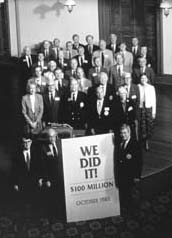
_____________________________________________
On Old Gold Weekend in 1985 the DePauw
trustees announced that
more than $00 million had been committed to the Sesquicentennial
Campaign. Those pictured are : R. G. Bottoms, E.L. Delves., J. J. Kelly,
S.B. Jones, W. F. Welch, N. B. Stephens, R. R. Frederick, J. Brady,
D. R. Daseke, A. J. Paine, T. H. Sams, A. E. Klauser, C. N. Frees,
G. R. Ensing,
E. C. Boxwell, E. E. Schulze, I. M. Rolland, J. K. Guild, E. S.
Pulliam,
R. H. Heyde, C. L. Grannon, N. J. Knights, J. W. Emison, G. A.
Gelzinnis,
J. J. Dwyer, J. W. Pearson, L. C. Hodapp, S. B. Phillips, V. V.
Bjork, T. A. Sargent, J. T. Anderson, R. D. Wood, R. E. Hamilton
__________________________________________________
A major
move was the appointment of three-time Olympic gold medalist Wilma
Rudolph as director of women's track and consultant to the president
on minority affairs. Bottoms also named Dorothy Brown, a Greencastle
native who had been the first black teacher and administrator in
the local public schools before becoming principal of an Indianapolis
elementary school and eventually an instructor in DePauw's education
department, to the post of assistant dean of students for minority
affairs. Blacks were also appointed to positions in admissions,
the library, the office of personnel, and campus security.
Two top administrative posts went to women for the first time. In
July 1986 Maria Falco, formerly academic dean and professor of political
science at Loyola University in New Orleans, came to DePauw as vice
president for academic affairs. In April of the next year DePauw
alumna Barbara E. Smith left an executive career in advertising
to accept the post of vice president for external affairs, with
responsibilities for development, alumni affairs, and public relations.
The history department's Barbara Steinson was also appointed assistant
to the president on a part-time basis.
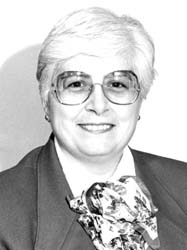 __________________________________ __________________________________
Maria J. Falco,
academic vice president
_______________________________________
When Falco was granted a special leave of absence to complete a
research and writing project, Vice President for Finance Fred Silander
assumed the added duties of acting academic vice president for 1987-88.
John White of the philosophy and religion department, who had been
assistant vice president for academic affairs, was promoted to the
position of associate dean of the university.
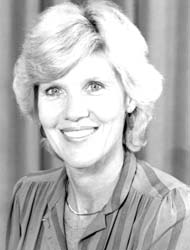
______________________________________
Barbara E.
Smith, vice president of external affairs
___________________________________________
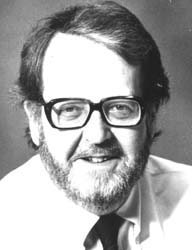
____________________________
Drake Mabry, director of the Center for
Contemporary Media
______________________________
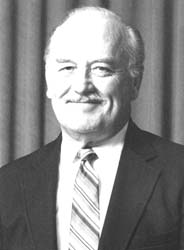
________________________________
Fred S. Silander, vice
president for finance
_____________________________________
The sesquicentennial year was not only a time for reflection upon
the long historical record and proud tradition of Indiana Asbury-DePauw
University, but also a time for thinking seriously about the institution's
present and future direction. Over the past century and a half the
university has undergone many significant changes, though perhaps
none so dramatic as the transformation of Indiana Asbury into the
new DePauw University in 1884. In recent decades, however the pace
of change has accelerated, as the university trustees, administration,
and faculty have endeavored to respond to changing conditions and
meet new challenges creatively and wisely.
Like many other contemporary institutions, DePauw University has
become a more complex organization than the 19th and early 20th
century university, with some of the same characteristics as the
modern corporation. During this time the administration and support
staff, for example, have experienced unprecedented growth, while
the teaching faculty, freed from much routine housekeeping detail,
has become even more independent and professionally oriented. The
student body itself has gained appreciable social and personal autonomy
as well as a larger share in the whole educational process.
At the same time DePauw's alumni have come to play a more extensive
part in university affairs, through representation on the board
of trustees and the newly instituted advisory board of visitors
and by virtue of their loyal support, both moral and financial.
Finally, the. board of trustees has gained in stature as the guardian
and sustainer of an educational enterprise which has grown, with
the assistance of generous benefactors, to encompass a total endowment
of more than $90 million and an annual budget in excess of $26 million.
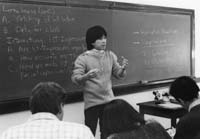 ____________________________________ ____________________________________
Donald Ryujin
lectures a psychology class.
_________________________________________
Moreover, DePauw University has been able to conserve its essential
spirit throughout all the changes of the past century and a half.
Remaining true to its original charter, which stated that the university
was to be "forever conducted on the most liberal principles,
accessible to all religious denominations, and designed for the
benefit of our citizens in general," DePauw has grown in service
to the nation and the world while striving to maintain a renewed
sense of academic community. The university, having met and overcome
various crises and found successful solutions to most of the problems
facing institutions of higher education in the past, may look forward
confidently to a future of continuing conservation and transformation.
Back
to Top
Pages:<<
Back 1 2 3
4 5
6 Next
>>
Appendixes:
Appendix A, Appendix
B
|

![]()

 __________________________________
__________________________________


 ____________________________________
____________________________________